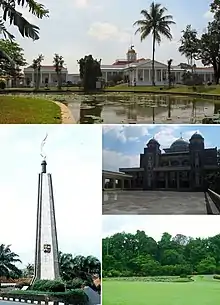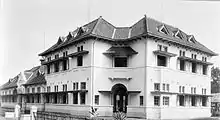History of Bogor
The History of Bogor includes various rulers leading up to the development of the densely populated Indonesian city of Bogor. The City of Bogor (Indonesian: Kota Bogor) was once the capital of Sunda Kingdom (Indonesian: Kerajaan Sunda) and was known as Pakuan Pajajaranknown. When the Dutch took over, the town was included in an administrative division known as Buitenzorg during the Dutch East Indies era. After independence, the city became part of the Bogor Regency. It has its history reflected in its architecture which includes buildings from the colonial, modern, post-modern, and contemporary periods. Bogor is located south of Jakarta on the island of Java, Indonesia. It is known for its Bogor Palace, Bogor Botanical Garden.

The kujang is a traditional weapon of the Sundanese people and is paid tribute by the Kujang Monument.
Buitenzorg was connected to Jakarta by rail in 1872. The town was the capital of an assistant-residency. As of 1894, principal buildings included the Bogor Cathedral, a mosque, a regent's mission, barracks, a prison (built 1848), a bathhouse, a Bogor Botanical Garden (laid out in 1817 by Van de Capellen) and the country palace of the governor-general.[1] Bogor is home to Bogor Agricultural University.
Colonial era architecture
 Masjid Raya Bogor
Masjid Raya Bogor.JPG.webp)
 Chinese temple in Buitenzorg
Chinese temple in Buitenzorg Ceremony at a Chinese Indonesian temple
Ceremony at a Chinese Indonesian temple Chinese grave
Chinese grave Chinese cemetery in "Soekasari", Buitenzorg
Chinese cemetery in "Soekasari", Buitenzorg Market by a Chinese temple in Buitenzorg
Market by a Chinese temple in Buitenzorg "High Agriculral School" (De Middelbare Landbouwschool)
"High Agriculral School" (De Middelbare Landbouwschool) Hotel Bellevue circa 1885
Hotel Bellevue circa 1885 Botanical research laboratory (1905)
Botanical research laboratory (1905) Herbarium and botanical museum at Buitenzorg Institute (1905)
Herbarium and botanical museum at Buitenzorg Institute (1905) Mosque
Mosque Social club (Sociëteit)
Social club (Sociëteit) Katrini School (opened 1918)
Katrini School (opened 1918) Library at the Bogor Botanical Gardens
Library at the Bogor Botanical Gardens European section of the Buitenzorg Red Cross Hospital circa 1930
European section of the Buitenzorg Red Cross Hospital circa 1930 Department of Agriculture, Industry and Trade
Department of Agriculture, Industry and Trade Headquarters of the Buitenzorg People's Credit Bank (Hoofdkantoor van de Buitenzorg Volkscredietbank) op Java met links beneden de wachthal voor klanten en op de bovenverdieping de woning van de administrateur TMnr 10001478.jpg
Headquarters of the Buitenzorg People's Credit Bank (Hoofdkantoor van de Buitenzorg Volkscredietbank) op Java met links beneden de wachthal voor klanten en op de bovenverdieping de woning van de administrateur TMnr 10001478.jpg Buitenzorg Market
Buitenzorg Market Nurses house at the Red Cross Hospital
Nurses house at the Red Cross Hospital Aerial photo of the Institute of Buitenzorg
Aerial photo of the Institute of Buitenzorg Gasworks (early 20th century)
Gasworks (early 20th century)
Postmodern and contemporary architecture
Contemporary architecture projects have included the Wood Box House (2009) and Sekolah Bogor Raya (Bogor Raya School) (2012) by Indra Tata Adilaras.[2]
 The City of Bogor with Mount Salak (Gunung Salak) in the background
The City of Bogor with Mount Salak (Gunung Salak) in the background Dormitory at Bogor Agricultural University (Asrama Tingkat Persiapan Bersama IPB)
Dormitory at Bogor Agricultural University (Asrama Tingkat Persiapan Bersama IPB)
References
- The Encyclopædia Britannica: A Dictionary of Arts, Sciences, and General Literature, Volume 4, Maxwell Sommerville, 1894
- Bogor ArchDaily